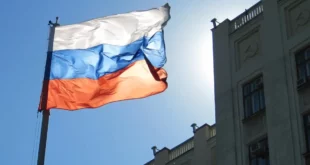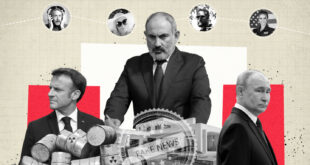 The FBI has been dragged into the investigation of Alexander Litvinenko’s death after details emerged that he had planned to make tens of thousands of pounds blackmailing senior Russian spies and business figures.Â
The FBI has been dragged into the investigation of Alexander Litvinenko’s death after details emerged that he had planned to make tens of thousands of pounds blackmailing senior Russian spies and business figures.Â
The Observer has obtained remarkable testimony from a Russian academic, Julia Svetlichnaja, who met Litvinenko earlier this year and received more than 100 emails from him. In a series of interviews, she reveals that the former Russian secret agent had documents from the FSB, the Russian agency formerly known as the KGB. He had asked Svetlichnaja, who is based in London, to enter into a business deal with him and ‘make money’.Â
Â
Litvinenko also handed a series of pictures of himself to Svetlichnaja that are published by The Observer today. One shows him with murdered Russian journalist Anna Politkovskaya, another serving as an army officer in an elite Russian army unit two decades ago and the third draped in the Union flag celebrating getting his British passport just before he was poisoned.Â
Â
We can also reveal that Scotland Yard officers involved in the investigation travelled to Washington to interview a former KGB agent, Yuri Shvets, who said he had vital information. He was a contact of Mario Scaramella, the Italian security consultant being treated at London’s University College Hospital after having been found to have been contaminated with polonium. His doctors said yesterday that he did not appear to be suffering from radiation poisoning.Â
Â
‘I believe I have a lead that can explain what happened,’ Shvets confirmed last week before he was interviewed as a witness in the presence of FBI agents. Shvets, who lives in Virginia and is now apparently in hiding, declined to elaborate. However, a business associate of Shvets, who asked to remain anonymous, told The Observer that Litvinenko had claimed in the weeks before his death that he possessed a dossier containing damaging revelations about the Kremlin and its relationship with the Yukos oil company. The associate claimed that Shvets compiled the dossier.Â
Â
Yukos was once owned by the oligarch Mikhail Khordorkovsky, who is serving seven years in a Russian jail for tax evasion. His supporters say he was convicted as a result of a show trial orchestrated by the Kremlin.Â
Â
The claims that Litvinenko had a dossier containing damaging information about the Kremlin echo separate claims he made to Svetlichnaja, who interviewed the former KGB agent earlier this year for a book she is writing about Chechnya.Â
Â
In today’s Observer, Svetlichnaja, a politics student at the University of Westminster, says Litvinenko claimed he had access to Russian intelligence documents containing information on individuals and companies that had fallen foul of the Kremlin.Â
Â
‘He told me he was going to blackmail or sell sensitive information about all kinds of powerful people, including oligarchs, corrupt officials and sources in the Kremlin,’ she said. ‘He mentioned a figure of £10,000 that they would pay each time to stop him broadcasting these FSB documents. Litvinenko was short of money and was adamant that he could obtain any files he wanted.’Â
Â
Litvinenko’s access to such documents could have made him an enemy of both big business interests and the Kremlin. However, his claims are almost impossible to verify and some political analysts have gone as far as to dismiss him as a fantasist.Â
Â
Shvets, 53, emerges as yet another character in an espionage saga linking Britain, Italy, the US and Russia. Like Litvinenko, Shvets worked for the Russian billionaire Boris Berezovsky, whom the Kremlin has tried unsuccessfully to extradite from Britain. Shvets was a KGB major between 1980 and 1990, during which time he worked undercover in Washington as a correspondent for the Russian news agency, Tass. He emigrated to the US in 1993 and wrote a book about his experiences.Â
Â
Shvets met Scaramella in Washington last year to discuss the Italian’s role as a consultant to the Mitrokhin commission, set up by the Italian government to investigate Russian infiltration during the Cold War. It has been alleged that Scaramella discussed with the commission’s chief, Paolo Guzzanti, whether they should look for evidence that Romano Prodi, Italy’s Prime Minister, was linked to the KGB. Prodi denies any link.Â
Â
Last night another link connecting the worlds of Italian politics and Russian intelligence emerged. Gerard Batten, an MEP for the UK Independence Party, confirmed Litvinenko had told him a man called ‘Sokolov’, who worked undercover as a Russian agent in the Seventies as a reporter for Tass, was the key link between senior Italian politicians and the KGB.Â
Â
This week Scotland Yard will interview two Russians who met Litvinenko on the same day he had lunch with Scaramella. Andrei Lugovoy, a former agent with the FSB, and Dmitry Kovtun met Litvinenko in the Millennium Mayfair hotel. Traces of polonium have been found on the planes on which they are believed to have travelled between London and Moscow
 Eurasia Press & News
Eurasia Press & News



